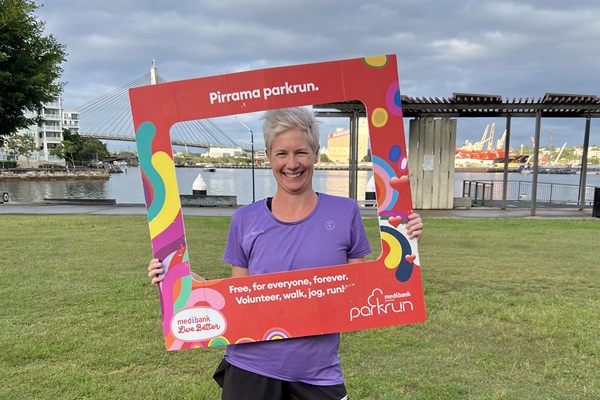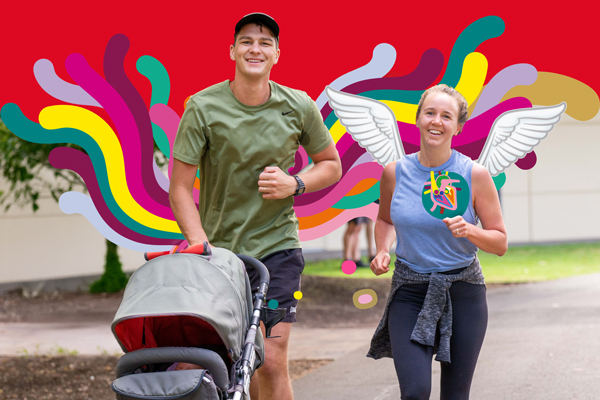-
Medibank has proudly supported parkrun in Australia since 2016 and has been parkrun's presenting partner since 2022.
Alicia Hopper still remembers the first time she attended parkrun.
“I was really nervous,” she says.
She’d been looking for somewhere to take her dog for a run and a friend suggested she try her local parkrun event – but she wasn’t quite sure what to expect.
“I think, particularly being a woman, any time there's physical exercise or something like that, you can be really conscious of how you look and what you're wearing and how people are going to judge you,” she says.
“So, it was amazing to get there and see all these people streaming to the welcome area.
“Everybody was different. There were young people and older people and people with dogs and people with prams and people who looked super-duper fit, and then other people who like to walk.
“It was so welcoming and such a safe, non-judgmental space.”
That was more than a decade ago, when there were only a couple of parkrun events in South Australia. Now, there’s more than 50. Alicia even helped set some of them up.
These days, she considers herself a “bit of a parkrun tourist” and gets out to a few different courses around South Australia.
parkrun remains a dependable part of her Saturday mornings. She says the sense of consistency and community she finds there is hugely beneficial to her wellbeing.
“It's a big part of what I call my mental health toolbox; parkrun is absolutely one of the cornerstones to that.”
Managing mental health
Alicia, who works as a cancer care nurse, was diagnosed with clinical depression in her late twenties.
“Many people in their life will go through a period of depression or anxiety, and it may be situational, related to whatever circumstances they're going through at the time, whether it's family, friends, life, health, work,” she says.
“But this came at a time when I should have been really happy. I was engaged to be married, had a really great job, and nothing was wrong in my life – but I just couldn't get off the couch.”
After receiving a formal diagnosis from her doctor, Alicia started on medication, but she also wanted to explore other lifestyle changes she could make to help manage her mental health.
“I learned that being active really helped me, but also that I need a good support network when I'm struggling. That's where parkrun really became important,” she says.
“There’ve been times over the years when I've had relapses and been struggling and I can still come out to parkrun – even if I don't feel like running or walking it, even if I don't feel like doing a formal volunteer role – I can still rock up; I'm still welcome.”
Alicia says the reliability of parkrun can feel crucial in those tough times.
“With parkrun, the location might be different, the people might be different. The course might be different, but you know what you're going to get. At your home parkrun, you start at the same time. You can run, walk, or volunteer. If you do the 5k, you get a finish token at the end and you hand that over with your barcode to get your time. You have coffee afterwards.”
parkrun began in 2004, at Bushy Park, in London. At the time, founder Paul Sinton-Hewitt was at a low point in his life and looking for a way to feel more connected to his friends. The coffee at the end was always a key part of the day.
More than two decades on, parkrun has ballooned into a global success story, with events happening every Saturday morning in 22 countries, from Italy to Eswatini. All are coordinated by volunteers.
Alicia says celebrating other people’s success can be an especially satisfying part of the day, which often happens if you are in a volunteer role.
A particular memory stands out to her – when she was volunteering as timekeeper.
“A lady and her friend came across just ahead of the Tail Walker, which is a volunteer role at all parkruns to ensure nobody finishes last. One of the ladies burst into tears when she crossed the finish line,” she remembers.
“She said, I've never been able to walk five kilometres before, and I never thought I could do it. She was just so proud of herself – as she should have been.
“We were just all jumping up and down with her, because we were so excited that this had been a huge milestone for her, and she really had not thought she was capable of it – but then she bloody well did it.”
Alicia’s parkrun advice
Alicia says you can absolutely take the course at your own pace and you “don't need to be a professional athlete or have the latest footwear” to take part – everyone’s always welcome.
She also suggests giving volunteering a try, particularly if you’re interested in building social connections.
“It's so much fun to volunteer, because you stand around and have a great old chinwag, you cheer everyone on, you learn a bit about how it all works. That's where that connection and that community really starts to click in,” she says.
“Whether or not you're experiencing mental health challenges, everybody needs community and connection. Loneliness is really hard. parkrun can be an easy and fun way to find that connection and meet your people.”
READ MORE: 7 ways walking boosts your health
parkrun is part of Alicia’s ‘mental health toolbox’


Live Better with parkrun.
All around the world, parkrun brings local communities together for a free weekly run, walk or jog. There are over 450 locations around Australia and everyone is welcome. Whether you’re attending to complete the course or participate as a volunteer on the day, there are no winners – just your own personal best.